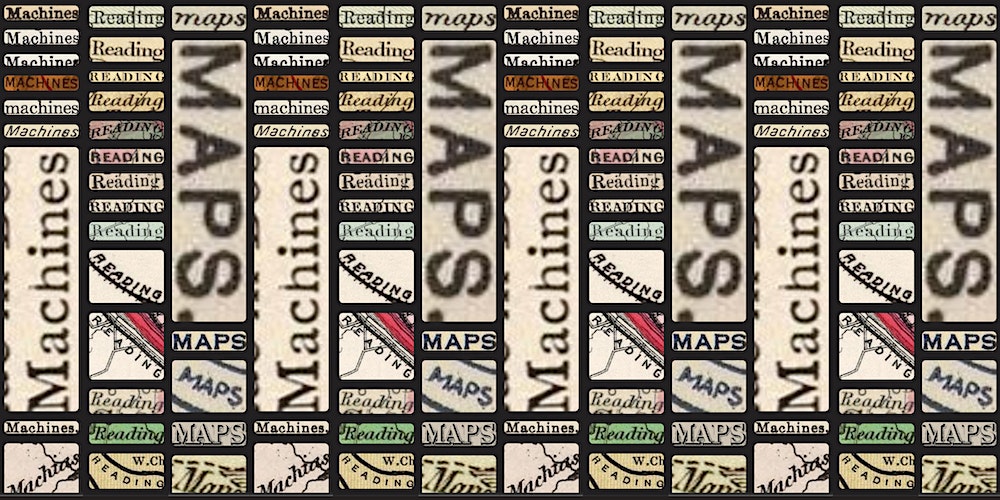Machines Reading Maps
Unlocking unique information from large collections of historical maps using AI
Project maintained by machines-reading-maps

Machines Reading Maps Summit! April 20-21, 2023
The Machines Reading Maps team will come together at Stanford University for two days of conference events dedicated to charting the future of historical cartography as data. Events will take place (as specified below) at the David Rumsey Map Center within Green Library and at the Center for Spatial and Textual Analysis (CESTA) on the 4th Floor of Wallenberg Hall.
For all events, we strongly recommend COVID-19 testing prior and masks during the event. Do not attend if you are experiencing symptoms of illness.
9AM-12PM PT Thursday, April 20, Demo for Developers and Stakeholders (Invitation only)
At the David Rumsey Map Center, Stanford Libaries
This session will introduce different components of the work to potential future stakeholders and developer community members who are interested in re-using these tools in other map collections or for research applications across collections.
9:00 - 10:00
- Chair: David Rumsey
- Valeria Vitale (University of Sheffield) & David Wong (Luna Imaging), Demo of Search & Annotation
- Stace Maples (Stanford Libraries), Why Does Machines Reading Maps Matter?
- Katie McDonough (Lancaster University & The Alan Turing Institute), Putting Machines Reading Maps in Context
~ Break - refreshments will be served in the Bender Room at Stanford Libraries ~
10:30 - 12:00
- Chair: Nicole Coleman (Stanford Libraries)
- Leeje Jang (University of Minnesota), mapKurator Codebase Briefing
- Rainer Simon & Valeria Vitale, Annotation Infrastructure and Value
- Drake Zabriskie (Luna Imaging) & David Wong, Implementing Search
- Katie McDonough & open discussion, Next Steps
~ Lunch Break ~
1PM-4PM PT Thursday, April 20, Presentation of Machines Reading Maps (Open to the public in-person and online, but please register in advance)
At the David Rumsey Map Center, Stanford Libaries
This conference, intended for future users, will address the methods behind the data creation and UX as well as the impact the new search and data access will have on research.
Panel 1, From Maps to Data and Back Again
- Chair: David Rumsey
- Jina Kim (University of Minnesota), “The mapKurator System: Extracting and Linking Text from Large Numbers of Historical Map Scans”
- Drake Zabriskie and David Wong, “LUNA Annotation Search and Display”
- Rainer Simon, “Map Annotation Overlay and Crowdsourced Corrections with Annotorious & LUNA”
- Valeria Vitale, “Discovering and enriching maps through their text”
- Katie McDonough, “Using Text on Maps for Research”
~ Break - refreshments will be served in the Bender Room at Stanford Libraries ~
Panel 2, Text on Maps: What does it mean for research?
- Chair: Julie Sweetkind-Singer (Stanford Libraries)
- Peter Leonard (Stanford Libraries)
- Kären Wigen (History, Stanford University)
- Nicole Coleman (Stanford Libraries)
- Nora Barakat (History, Stanford University)
- Open Discussion
9AM-12PM PT Friday, April 21, Building a Developer Community (Invitation only)
At the David Rumsey Map Center, Stanford Libaries
The purpose of this session is to identify opportunities and friction points while sketching out the future of an open source project building on the foundations of Machines Reading Maps.
- Opening remarks by the MRM team
- Session 1: Shape and Priorities of the Initiative Going Forward
- Session 2: Opportunities and Friction Points to Date
~ Lunch Break ~
1PM-4PM PT Friday, April 21, Machines Reading Maps Hands-On Workshop (In person only, register in advance)
At the Center for Spatial and Textual Analysis Conference Room, 4th Floor, Wallenberg Hall
Search within maps! Visualize and analyze data automatically identified on maps!
This hands-on workshop, led by Machines Reading Maps team members, presents the new, experimental features developed by the Machines Reading Maps project for the David Rumsey Map Collection (DRMC).
- Part 1 Querying full text of maps
- In the first part of the workshop, participants will discover the new kinds of searches and visualizations that are enabled on the DRMC by the application of the mapKurator machine-learning pipeline. Through the discussion of guided paths through the large and diverse Rumsey collection, participants will become familiar with the different kinds of queries that can be run when it is possible to search the maps not just by their title and metadata but their full text.
- Part 2 Analyzing the dataset generated by mapKurator
- The second half of the workshop, you will learn to navigate the corpus of map text, select a relevant sample, and then interrogate, visualize and compare within an open dataset that has been created by processing circa 60,000 georeferenced maps in the DRMC. The MRM team will guide participants through a computational workflow using simple Jupyter and Observable notebooks.
- NOTE: This workshop does not require any previous computational knowledge, but some familiarity with Jupyter notebooks is welcome. To prepare, we recommend that you check out this tutorial on Jupyter notebooks: https://programminghistorian.org/en/lessons/jupyter-notebooks. Please, bring your own laptop.
4PM-5PM PT Friday, April 21, Reception!
Join us at the Center for Spatial Analysis (CESTA) to congratulate the team and welcome the community!